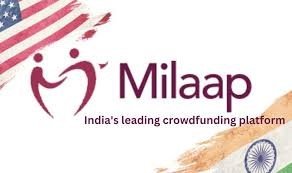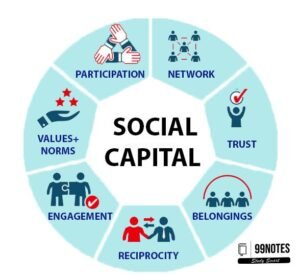NGOS & CIVIL SOCIETY ROLE
- Non-Governmental Organization (NGO)
- Evolution of NGOs
- Types of NGOs
- Legal & Regulatory Framework for NGOs
- Role of NGOs in Development and Welfare
- NGOs in Disaster Management & Crisis Response
- NGOs in Policy Advocacy & Social Accountability
- Government Schemes Supporting NGOs
- Challenges Faced by NGOs
- Digital Transformation of NGOs
- Way Forward for NGOs
- Civil Society Role
- Evolution of Civil Society
- Role in Democratic Deepening
- Civil Society and Social Capital Building
- Civil Society and Ethical Governance
- Civil Society in Crisis & Conflict Mediation
- Civil Society in Policy Influence and Reform
- Role in Environmental & Rights-Based Movements
- Challenges to Civil Society
- Way Forward for Civil Society
- Related FAQs of NGOS & CIVIL SOCIETY ROLE
Non-Governmental Organizations (NGOs) and Civil Society Organizations (CSOs) act as vital intermediaries between the state and citizens in modern democracies. As non-profit, voluntary, and autonomous entities, they supplement state efforts in service delivery, welfare schemes, and policy advocacy. Their presence becomes particularly significant in areas where state machinery is weak, inaccessible, or under-resourced. NGOs and civil society together bring in innovation, inclusivity, and people-centric approaches to governance, often addressing the needs of marginalized and vulnerable sections.
In democratic governance, civil society plays a crucial role in fostering participatory decision-making, transparency, and accountability. Through social audits, Right to Information (RTI) campaigns, Public Interest Litigations (PILs), and grievance redressal mechanisms, civil society ensures that governance remains responsive and just. By mobilizing communities, shaping public opinion, and acting as watchdogs, NGOs and CSOs strengthen grassroots democracy and bridge the gap between policy formulation and ground realities. Their evolving role has transformed governance from a top-down administrative model to a participatory and inclusive process.
Non-Governmental Organization (NGO)
Non-Governmental Organizations (NGOs) are voluntary, non-profit institutions operating independently from the government, formed by individuals or groups with the primary aim of promoting social welfare, development, and public interest. They are committed to addressing diverse socio-economic, cultural, environmental, and humanitarian issues through service delivery, capacity building, and advocacy.
Unlike commercial entities, NGOs do not seek profits but reinvest any surplus into their developmental objectives. They function at local, national, or international levels and act as critical players in democratic governance by voicing citizen concerns, holding authorities accountable, and bridging the gap between the state and the people—especially marginalized communities.
Evolution of NGOs
NGOs have evolved as powerful non-state actors playing diverse roles in welfare, rights advocacy, and governance. Their journey reflects a transition from traditional charity and community service to structured institutions engaged in development and democratic deepening. Both globally and in India, the evolution of NGOs has been shaped by historical contexts, political shifts, and socio-economic needs.
- Ancient & Medieval Periods – In ancient India, voluntary work was rooted in religion and ethics—seen in Buddhist Sanghas, Jain institutions, and Bhakti movement groups that provided education and food to the poor. Globally, churches and guilds played a similar philanthropic role. These informal efforts were early expressions of civil society involvement in public welfare.
- Colonial Era – During British rule, reformers like Raja Ram Mohan Roy, Ishwar Chandra Vidyasagar, and later Mahatma Gandhi created organizations to fight social evils like sati, promote women’s education, and organize rural service. These initiatives laid the foundation for India’s NGO movement based on self-reliance, social reform, and non-violent activism.
 Post-Independence Phase (1947–1970s) – After independence, NGOs supported the government in rural development, community health, and literacy programs. Many were Gandhian in orientation and worked on village-based development. Internationally, NGOs expanded in newly independent countries, often supported by bilateral aid for development assistance.
Post-Independence Phase (1947–1970s) – After independence, NGOs supported the government in rural development, community health, and literacy programs. Many were Gandhian in orientation and worked on village-based development. Internationally, NGOs expanded in newly independent countries, often supported by bilateral aid for development assistance.- Expansion in 1980s–90s – With the rise of global aid and liberalization, NGOs began professionalizing. They addressed issues like poverty, women’s empowerment, education, and environment. In India, groups like SEWA and PRATHAM emerged. Globally, INGOs like Oxfam and World Vision grew influential in humanitarian and policy spheres.
- Rights-Based Era (2000s) – The focus shifted to rights, justice, and accountability. Indian NGOs started using legal tools like PILs, RTI, and social audits (e.g., MKSS) to fight corruption and demand entitlements. Internationally, NGOs pushed global agendas like human rights, climate justice, and gender equity through UN and civil society networks.
- Tech-Driven & Crisis Response Era (2010s–Present) – NGOs now use digital tools for fundraising, monitoring, and outreach. They played vital roles during COVID-19 in relief, health, and awareness. However, increasing scrutiny under FCRA, push for transparency, and debates over foreign funding have also posed challenges to their operations.
Types of NGOs
NGOs vary widely in structure, function, and area of work. Their classification helps understand their approach, legal identity, and outreach mechanisms. Broadly, NGOs are categorized based on their functional roles and legal registrations, and they also include faith-based and international organizations.
- Service Delivery NGOs – These NGOs implement grassroots welfare programs in health, education, sanitation, and rural development. They often fill last-mile gaps in government schemes. Example: PRATHAM (education), CARE India (healthcare).
- Advocacy NGOs – They work to influence public policy, protect human rights, and mobilize public opinion on issues like environment, gender justice, or transparency. Example: CHRI (human rights), CSE (environmental advocacy).
- Capacity Building NGOs – Focus on training, research, and strengthening of local institutions or community organizations. They build skills, leadership, and participatory planning abilities. Example: PRIA (Participatory Research in Asia).
- Trusts – Legally registered under the Indian Trusts Act, they are managed by trustees and often focus on philanthropic or charitable work. They have less operational flexibility but offer easier compliance.
- Societies – Registered under the Societies Registration Act, 1860, these NGOs require managing committees and democratic structures. They are common in education, health, and cultural activities.
- Section 8 Companies – Formed under the Companies Act, 2013, they function like companies but reinvest profits in social objectives. Known for better transparency and corporate governance. Example: Teach for India.
- Faith-Based NGOs – These organizations are driven by religious principles but deliver secular services such as health, disaster relief, and education. Example: Ramakrishna Mission, Christian Medical Association of India.
- International NGOs (INGOs) – These are global organizations operating across borders, often in development, humanitarian aid, and advocacy. In India, they must comply with FCRA regulations. Example: Oxfam, Save the Children.
Legal & Regulatory Framework for NGOs
NGOs in India function within a multi-tiered legal structure that governs their registration, funding, tax exemptions, and accountability. These regulations ensure NGOs operate transparently and in alignment with national interests.
 Societies Registration Act, 1860 – Provides legal backing for NGOs to register as societies for charitable and public welfare purposes, mandating regular reporting and democratic functioning.
Societies Registration Act, 1860 – Provides legal backing for NGOs to register as societies for charitable and public welfare purposes, mandating regular reporting and democratic functioning.- Indian Trusts Act, 1882 – Enables NGOs to form public charitable trusts, particularly in states without specific laws, with operations governed by a trust deed and board of trustees.
- Companies Act, 2013 (Section 8) – NGOs can register as not-for-profit companies, allowing structured governance and reinvestment of income solely for social objectives.
- FCRA, 2010 – Regulates receipt and use of foreign contributions by NGOs, ensuring funds are not misused and mandating registration and annual reporting.
- Income Tax Act (Sections 12A & 80G) – Provides tax exemptions for NGOs and benefits for donors, encouraging philanthropic donations and financial sustainability.
- Regulatory Institutions – MHA (FCRA), NITI Aayog (NGO Darpan), and Income Tax Dept oversee legal compliance, funding, and policy engagement of NGOs in India.
Together, these frameworks aim to balance autonomy with accountability, promoting transparency and effectiveness in NGO operations.
Role of NGOs in Development and Welfare
NGOs serve as vital agents of inclusive growth by addressing grassroots issues, ensuring last-mile delivery of services, and amplifying community participation. Their work spans across sectors like health, education, environment, and empowerment, effectively supplementing government efforts in welfare delivery.
- Healthcare Access – NGOs offer essential services such as mobile health units, maternal care, and awareness campaigns in underserved areas (e.g., Karuna Trust, Smile Foundation).
- Educational Outreach – They bridge gaps in formal education through non-formal learning centres, remedial classes, and digital initiatives (e.g., Pratham’s Read India).
- Sanitation & Hygiene – NGOs contribute to Swachh Bharat by building toilets, spreading hygiene awareness, and implementing WASH programs (e.g., Sulabh International).
- Women Empowerment – NGOs like SEWA enhance women’s financial independence, leadership, and rights awareness through SHGs and skill training.
- Tribal Welfare – NGOs work with tribal communities on land rights, health, education, and sustainable livelihoods, preserving indigenous cultures and securing entitlements.
- Environmental Protection – They promote afforestation, water conservation, clean energy, and environmental education aligned with SDG-13 and 15 (e.g., CSE, WWF India).
- Livelihood Generation – Through skill development, microfinance, and entrepreneurship programs, NGOs boost rural income and reduce poverty (e.g., BAIF, Goonj).
- Bridging State Gaps – NGOs act as intermediaries, filling critical gaps in state delivery, ensuring community participation, and making governance more responsive.
By addressing both service and structural gaps, NGOs have evolved into key stakeholders in India’s developmental landscape, ensuring equity, empowerment, and sustainability.
NGOs in Disaster Management & Crisis Response
NGOs play a frontline role in managing disasters by providing swift humanitarian aid, long-term rehabilitation, and psychological care. Their grassroots presence, agility, and community trust make them indispensable during crises like pandemics, natural calamities, and conflicts.
- Emergency Relief Work – NGOs swiftly distribute food, water, clothing, and medical aid during floods, cyclones, or earthquakes (e.g., Goonj during Kerala floods, 2018).
 COVID-19 Response – They provided PPE kits, oxygen cylinders, vaccination drives, migrant relief, and awareness (e.g., GiveIndia, Hemkunt Foundation).
COVID-19 Response – They provided PPE kits, oxygen cylinders, vaccination drives, migrant relief, and awareness (e.g., GiveIndia, Hemkunt Foundation).- Psychosocial Support – NGOs offer counselling, trauma healing, and child protection during crises, especially for vulnerable sections like women and children.
- Rehabilitation Efforts – Post-disaster, NGOs help rebuild homes, schools, and livelihoods, ensuring resilience and long-term recovery (e.g., SEEDS India).
- Conflict Zone Engagement – NGOs support victims of communal violence, displacement, and ethnic conflicts with relief and peacebuilding (e.g., Aman Biradari in riot-hit areas).
- Training & Preparedness – NGOs conduct community training in disaster risk reduction (DRR), first-aid, and mock drills to enhance local preparedness.
- Coordination with Government – NGOs partner with NDRF, NDMA, and local authorities for coordinated relief and policy inputs.
- International Collaborations – They also collaborate with INGOs and UN bodies (e.g., UNICEF, Red Cross) for funding, technical aid, and wider outreach.
NGOs act as a crucial humanitarian bridge between affected communities and state machinery, ensuring relief is timely, equitable, and people-centric.
NGOs in Policy Advocacy & Social Accountability
NGOs are instrumental in deepening democracy by promoting transparency, public participation, and social justice. They act as intermediaries between the state and citizens, enabling collective voice and accountability in governance. Through legal tools, community awareness, and institutional engagement, NGOs drive policy responsiveness and ethical governance.
- Public Interest Litigations (PILs) – NGOs like PUCL and HRLN file PILs on issues of human rights, environment, and welfare, compelling judicial interventions to uphold constitutional rights. These legal actions expand access to justice for the marginalized and set important precedents for governance reforms.
- Right to Information (RTI) – NGOs such as MKSS were instrumental in the RTI movement, empowering citizens to demand information from the state. RTI has become a tool for accountability, helping expose scams, misuse of power, and inefficiencies in public service delivery.
- Social Audits (e.g., MGNREGA) – NGOs facilitate social audits in schemes like MGNREGA, ensuring transparency and participation at the grassroots. These audits help uncover corruption, improve implementation, and restore faith in welfare schemes among the rural poor.
- Awareness Campaigns – NGOs conduct campaigns on education, health, rights, and environmental issues, creating informed and responsible citizens. These efforts also build pressure on political leadership to address neglected issues and fulfill policy promises.
- Watchdog & Grievance Redress Roles – NGOs support whistle-blowers, provide legal aid, and act as platforms for voicing citizen grievances. Their interventions enhance accountability and empower individuals to challenge injustice without fear.
- Policy Influence & Legislative Inputs – Think-tank NGOs like PRS Legislative Research provide data-driven insights, draft bills, and suggest amendments to improve policy outcomes. Their work bridges the gap between civil society expertise and formal policymaking processes.
| Success Stories & Case Studies of NGOs |
|
Several Indian NGOs have showcased how innovative, community-based approaches can drive large-scale social transformation. Their models reflect adaptability, inclusion, and deep-rooted grassroots engagement. These success stories also act as replicable templates for state and global partnerships in development work.
These success stories demonstrate the transformative role NGOs play in reaching the last mile, promoting inclusive development, and influencing national discourse. Their flexibility and innovation allow them to adapt faster than traditional state machinery. |
Government Schemes Supporting NGOs
The Indian government recognizes NGOs as vital partners in developmental governance and service delivery. Various schemes, portals, and policy frameworks have been instituted to formalize collaboration, streamline funding, and ensure transparency. These initiatives aim to align NGO efforts with national priorities.
- NGO Darpan Portal – A digital interface by NITI Aayog for NGO registration and partnership with ministries. It ensures transparency, enables online tracking of grants, and simplifies the empanelment process for developmental work.
- Corporate Social Responsibility (CSR) Support – Under Section 135 of the Companies Act, companies can partner with eligible NGOs for CSR fund utilization. This has created a significant financing avenue for social impact initiatives.
- NITI Aayog Empanelment – NITI Aayog maintains a list of verified NGOs eligible for government collaboration. Empanelled NGOs are preferred for grant-in-aid and policy consultations.
- Swachh Bharat Mission (SBM) – NGOs played a vital role in behavior change communication, awareness drives, and sanitation campaigns under SBM. They contributed to toilet construction, waste management, and community mobilization.
- Pradhan Mantri Kaushal Vikas Yojana (PMKVY) – NGOs and civil society organizations have been key partners in skill training delivery, especially in rural and marginalized areas, under this flagship skilling initiative.
- POSHAN Abhiyaan – Focused on nutrition and child health, this scheme includes NGO partnerships for spreading awareness, capacity building of Anganwadi workers, and grassroots monitoring.
These initiatives highlight the government’s evolving approach to partner with credible NGOs in flagship schemes. Such convergence enhances last-mile reach, promotes innovation, and improves accountability in welfare delivery.
Challenges Faced by NGOs
Despite playing a critical role in development and governance, NGOs face several structural, regulatory, and operational challenges. These issues often affect their credibility, effectiveness, and ability to scale interventions. Addressing them is vital for sustaining their contribution to nation-building.
 FCRA Restrictions and Foreign Funding Delays – The Foreign Contribution (Regulation) Act (FCRA) 2010 has imposed stringent regulations, leading to cancellation of licenses and delays in foreign funding. This affects grassroots operations and financial planning.
FCRA Restrictions and Foreign Funding Delays – The Foreign Contribution (Regulation) Act (FCRA) 2010 has imposed stringent regulations, leading to cancellation of licenses and delays in foreign funding. This affects grassroots operations and financial planning.- Politicization and Trust Deficit – NGOs are often accused of pushing political or ideological agendas. This has created suspicion among stakeholders and limited genuine organizations from accessing government collaborations.
- Weak Internal Governance and Transparency – Many NGOs lack robust financial audits, impact assessment systems, or transparent decision-making processes. This reduces their credibility and donor confidence.
- Lack of Accountability Mechanisms – Absence of standardized accountability frameworks and weak self-regulation hinder public trust. Monitoring mechanisms like NGO Darpan and CSR audits are still evolving.
- Capacity and Skill Gaps – Small and rural NGOs often lack trained staff, domain experts, or technology tools. This affects quality of implementation, scalability, and innovation in service delivery.
- Regulatory Compliance Burden – Multiple legal requirements from FCRA, Income Tax Act, and state-level laws create confusion and administrative burden, especially for smaller NGOs with limited legal support.
- Funding Volatility and Donor Dependency – Most NGOs rely on project-based short-term grants, making long-term planning difficult. Delayed disbursal and uncertain renewals hamper sustained outcomes.
- Negative Media and Public Perception – Scandals involving a few NGOs tarnish the image of the entire sector. Media narratives often overlook grassroots impact, leading to general mistrust.
Addressing these challenges through structural reforms, capacity-building, and stakeholder dialogue is essential. A balanced ecosystem with regulatory oversight and operational autonomy will enable NGOs to serve as effective partners in democratic governance.
Digital Transformation of NGOs
Digitalization has emerged as a game-changer for NGOs, expanding their outreach, improving transparency, and enabling real-time engagement with beneficiaries and donors. By leveraging Information and Communication Technologies (ICT), NGOs are redefining how development services are delivered and monitored.
- Use of ICT for Monitoring and Data Collection – NGOs now use mobile apps, MIS systems, and GIS tools to track real-time data on field activities, beneficiaries, and impact metrics. This enhances transparency and program efficiency.
 Social Media for Awareness and Mobilization – Platforms like Twitter, Instagram, and Facebook are used for advocacy, citizen engagement, and campaign-building. Hashtag movements and viral content help NGOs amplify causes quickly.
Social Media for Awareness and Mobilization – Platforms like Twitter, Instagram, and Facebook are used for advocacy, citizen engagement, and campaign-building. Hashtag movements and viral content help NGOs amplify causes quickly.- Online Fundraising and Crowdfunding – Websites like Milaap, Ketto, and GiveIndia allow NGOs to raise funds for health, education, and disaster relief initiatives. These platforms attract younger donors and expand financial independence.
- Digital Governance Partnerships – NGOs collaborate with governments in e-governance projects, digital literacy campaigns, and last-mile tech-enabled delivery of welfare schemes like DBT, Aadhaar services, etc.
- Civic Tech Platforms and Innovation – Civil society organizations are building apps and platforms for grievance redressal, social audits (e.g., MGNREGA), and participatory budgeting, enhancing democratic accountability.
- Capacity Building via E-Learning and Webinars – NGOs use online training, digital classrooms, and knowledge platforms to train field workers, volunteers, and beneficiaries in diverse areas from legal rights to sustainable farming.
Digital transformation is not just a tool but a necessity for NGOs to remain agile, scalable, and accountable in today’s governance landscape. Ensuring digital access, cyber safety, and capacity-building support will further empower NGOs in bridging the governance gap.
Way Forward for NGOs
As NGOs evolve into critical partners in governance and development, there is a growing need to enhance their effectiveness, credibility, and collaboration with the state. The future roadmap must focus on reforms, ethical conduct, and institutional strengthening.
- Enhancing Transparency and Accountability – NGOs must adopt robust audit practices, transparent fund utilization, and public disclosure norms to build public trust and donor confidence. Regular reporting to oversight bodies like FCRA and NITI Aayog should be ensured.
- Capacity Building and Professionalization – Investment in staff training, leadership development, and technology adoption is crucial. Building thematic and managerial competencies will improve service delivery and sustainability.
- Institutional and Legal Reforms – Streamlining compliance processes, ensuring timely FCRA clearance, and providing legal clarity can reduce bureaucratic delays. Establishing an independent regulatory body can ensure fair oversight.
- Promoting Ethical Standards and Self-Regulation – NGOs should evolve internal codes of conduct, grievance redressal mechanisms, and peer accountability frameworks to ensure integrity and ethical governance.
- Leveraging Public–Private Partnerships – Collaborations with CSR arms, startups, and academic institutions can bring innovation, funding, and research support to NGOs working on complex development issues.
- Aligning with “Minimum Government, Maximum Governance” – NGOs must complement state efforts by filling governance gaps, mobilizing communities, and providing decentralized service delivery in underserved regions.
NGOs, when empowered with autonomy, resources, and trust, can act as transformative agents of social change. Strengthening them through policy, partnerships, and performance-driven approaches will make governance more inclusive, ethical, and impactful.
 Civil Society Role
Civil Society Role
Civil society refers to the collective space outside of the government and commercial sectors where individuals come together voluntarily to advance shared interests, values, or causes. It includes institutions like NGOs, community-based organizations (CBOs), faith groups, professional associations, and citizen movements. These groups act as a bridge between citizens and the state, promoting participatory democracy, social justice, accountability, and inclusive development.
Evolution of Civil Society
Civil society has been a vital part of human civilization, acting as a bridge between the state and citizens. It has evolved from traditional community systems to modern, organized platforms advocating for rights, justice, and inclusive governance. In both India and globally, civil society has played a transformative role in socio-political development and democratic deepening.
- Ancient Period – In ancient India, institutions like sabhas and samitis enabled community decision-making and participatory governance. Guilds and religious communities also functioned as early civil society actors. These bodies played a role in maintaining social order and resolving local disputes.
- Medieval Period – The Bhakti and Sufi movements emerged as civil society forces questioning orthodoxy and promoting social harmony. They fostered community bonding across caste and religion. Their inclusive messages laid the groundwork for moral reform and societal transformation.
- Colonial Era – Reformers like Raja Ram Mohan Roy, Ishwar Chandra Vidyasagar, and Jyotiba Phule launched social reform movements. They worked to abolish practices like Sati and promote education, especially for women. These movements acted as precursors to organized civil society.
- Freedom Struggle – Gandhi institutionalized civil society through non-violent mass mobilization. Movements like the Salt Satyagraha and Quit India became symbols of participatory activism. Civil society became a tool for political awakening and national unity.
- Post-Independence Phase – Civil society focused on development, social justice, and human rights. Movements like Chipko, Narmada Bachao, and women’s rights groups gained momentum. They acted as pressure groups demanding policy shifts and inclusive governance.
- Post-Liberalization (1990s Onward) – Economic reforms brought both opportunities and inequalities. NGOs and civil society groups advocated for rights-based legislations like RTI and MNREGA. They also emerged as watchdogs to hold the state accountable.
- Contemporary Period – Today’s civil society includes digital platforms, youth movements, and global networks. They raise voices on climate change, LGBTQ+ rights, and anti-corruption. Civil society continues to adapt, innovate, and amplify marginalized voices in the digital age.
Role in Democratic Deepening
Civil society plays a crucial role in deepening democracy by acting as a bridge between the government and the people. It not only empowers citizens to assert their rights but also fosters a culture of participation, accountability, and transparency in governance. Through advocacy, awareness, and active engagement, civil society enhances the inclusivity and responsiveness of democratic institutions.
- Citizen Participation: Civil society mobilizes public opinion and facilitates grassroots engagement through campaigns, public forums, and participatory planning processes.
- Electoral Reforms: NGOs advocate for electoral transparency, voter education, and monitoring of political funding, promoting cleaner and fairer elections.
- Inclusive Governance: Civil society promotes representation and inclusion of marginalized groups in policymaking, ensuring social equity and justice.
- Voter Awareness Campaigns: Organizations conduct door-to-door awareness drives, workshops, and social media campaigns to boost informed electoral participation.
- RTI and Legal Literacy: CSOs empower citizens through awareness on RTI, legal aid, and constitutional rights, strengthening participatory democracy.
- Strengthening PRIs and ULBs: NGOs build capacity of Panchayati Raj Institutions and urban bodies through training, advocacy, and supporting decentralized planning.
- Social Audits and Public Hearings: Civil society conducts social audits of public schemes like MGNREGA, ensuring accountability and transparency in delivery.
In essence, civil society strengthens democratic culture by promoting civic engagement, holding the state accountable, and fostering inclusive governance. Its contribution is vital for nurturing a participatory, rights-based democracy in India.
Civil Society and Social Capital Building
Civil society plays a foundational role in nurturing social capital by fostering trust, cooperation, and collective action within communities. It strengthens the informal networks and norms that bind society, enabling individuals and groups to work together effectively for shared goals. Through participatory efforts and inclusive practices, civil society builds resilience and unity at the grassroots.
- Voluntary Associations: Civil society includes community groups, clubs, cooperatives, and forums that promote collective engagement and grassroots democracy.
- Trust-Building: Regular interaction through civil society platforms enhances interpersonal trust, bridging social and economic divides.
- Participatory Development: Civil society facilitates citizen involvement in local development projects, empowering communities and ensuring need-based outcomes.
- Promoting Cooperation: It encourages collaboration among diverse social groups, resolving conflicts and fostering harmony in pluralistic settings.
- Self-Help Initiatives: Community-driven efforts like SHGs and cooperatives reflect self-reliance and mutual support, especially in rural areas.
- Mutual Accountability: Civil society nurtures a culture of shared responsibility and collective monitoring, ensuring transparency in development efforts.
- Social Networks and Norms: Through regular interaction, civil society strengthens informal norms of reciprocity, trust, and civic virtue.
Ultimately, civil society is the glue that binds democratic societies by creating social capital that sustains collective progress, fosters resilience, and promotes inclusive growth.
Civil Society and Ethical Governance
Civil society is a critical pillar of ethical governance as it acts as a watchdog, mobilizer, and advocate for integrity in public administration. By promoting transparency, accountability, and citizen engagement, civil society challenges unethical practices and empowers people to demand good governance. Its role in anti-corruption movements and participatory mechanisms has transformed democratic functioning in India.
- Advocacy for Transparency: Civil society organizations (CSOs) have been at the forefront of demanding open governance, pushing for laws like RTI and public disclosure norms.
 Anti-Corruption Movements: Movements like India Against Corruption mobilized masses against unethical governance and demanded strong institutional mechanisms.
Anti-Corruption Movements: Movements like India Against Corruption mobilized masses against unethical governance and demanded strong institutional mechanisms.- Social Audits: CSOs have enabled community-led audits in schemes like MGNREGA, ensuring accountability and reducing leakages.
- Whistle-blower Support: Civil society networks have supported whistle-blowers by amplifying their concerns and providing legal/social assistance.
- Participatory Budgeting: NGOs and local groups have promoted citizen participation in budget planning, ensuring ethical allocation of resources.
- Jan Lokpal Movement: This mass movement demanded an independent anti-corruption body and highlighted the strength of civil society in governance reform.
- NCPRI (National Campaign for People’s Right to Information): Played a pivotal role in conceptualizing and advocating for the RTI Act.
In essence, civil society serves as a moral compass in democratic governance, pushing the state towards transparency, justice, and responsiveness to the people.
Civil Society in Crisis & Conflict Mediation
Civil society plays a vital role in maintaining social cohesion during crises and conflicts by acting as mediators, peace-builders, and sources of community strength. From promoting communal harmony to psychological support and post-crisis rehabilitation, civil society bridges emotional, social, and administrative gaps left by the state.
- Peace-building: CSOs actively work to diffuse tensions in violence-prone areas by initiating dialogue, trust-building, and community-level negotiations.
- Communal Harmony: Organizations like Aman Biradari promote inter-faith unity and counter hate speech through grassroots efforts.
- Conflict Resolution: NGOs mediate disputes in tribal, rural, and urban areas, helping to peacefully resolve resource-based and social conflicts.
- Psychological Support: During natural disasters and riots, civil society provides trauma counseling and emotional aid, especially to vulnerable groups.
- Community Resilience Building: NGOs empower local communities with skills, resources, and awareness to better withstand future crises.
- Rehabilitation and Relief: In conflict or disaster aftermath, civil society aids in rebuilding lives, offering shelter, legal aid, and education continuity.
- Partnership with State & INGOs: Civil society often collaborates with governments and international organizations in post-conflict rebuilding efforts.
Through trust, dialogue, and empathetic action, civil society becomes a catalyst of peace and healing, ensuring no section of society is left behind during or after a crisis.
Civil Society in Policy Influence and Reform
Civil society plays a transformative role in shaping public policies by acting as a bridge between citizens and the state. Through advocacy, expert inputs, and community engagement, it ensures that policy frameworks remain inclusive, evidence-based, and grounded in people’s real needs.
- Think Tanks and Research Bodies: Institutions like Centre for Policy Research and PRS Legislative Research provide data-driven analysis for policymaking.
- Public Mobilization: Civil society groups rally citizen voices through campaigns, petitions, and protests (e.g., RTI movement, anti-corruption movement).
 Policy Advocacy: NGOs submit policy recommendations and draft bills, often collaborating with parliamentary committees.
Policy Advocacy: NGOs submit policy recommendations and draft bills, often collaborating with parliamentary committees.- Community-Centric Planning: They promote participatory rural and urban planning, integrating grassroots feedback in schemes like MGNREGA and PMAY.
- Media Engagement: Civil society leverages media to spotlight policy gaps and push for timely reforms (e.g., NEP consultation feedback by education NGOs).
- Legal Interventions: Filing PILs and legal petitions to address policy loopholes or ensure proper enforcement (e.g., forest rights, disability rights).
- Capacity Building of Policymakers: Organizing training workshops and public consultations to sensitize bureaucrats and lawmakers to on-ground realities.
Thus, civil society helps democratize policymaking by transforming citizen concerns into structured policy inputs, fostering accountability, and ensuring that reforms serve the collective public good.
Role in Environmental & Rights-Based Movements
Civil society has been central in championing environmental justice and protecting the rights of marginalized communities. It mobilizes public opinion, organizes resistance, and ensures that developmental processes remain sustainable and equitable.
- Chipko Movement: A grassroots protest led by villagers (especially women) in Uttarakhand during the 1970s to prevent deforestation and conserve forests.
- Narmada Bachao Andolan: Led by Medha Patkar, this movement opposed large dam construction on the Narmada River, highlighting issues of displacement and ecological impact.
- POSCO Resistance (Odisha): Local civil society groups opposed land acquisition for a steel plant, citing environmental degradation and tribal displacement.
- Environmental Litigation: NGOs like the Centre for Science and Environment have used courts to demand action on pollution, EIA violations, and climate issues.
 Advocacy for Forest Rights: Civil society facilitated the passage and implementation of the Forest Rights Act, 2006 for tribals and forest dwellers.
Advocacy for Forest Rights: Civil society facilitated the passage and implementation of the Forest Rights Act, 2006 for tribals and forest dwellers.- Support to Indigenous Communities: Organizations work to preserve traditional ecological knowledge and secure community resource rights.
- Climate Change Awareness: Campaigns on sustainability, green energy, and carbon neutrality (e.g., Fridays for Future India, Let India Breathe).
Through such movements, civil society ensures that economic growth does not come at the cost of environmental degradation or social injustice, reinforcing the idea of sustainable and inclusive development.
Challenges to Civil Society
Civil society plays a vital role in strengthening democracy, promoting rights, and ensuring accountability. However, it increasingly faces structural and operational constraints that limit its ability to function effectively and independently. These challenges stem both from external regulatory pressures and internal weaknesses.
- Shrinking civic space: There is growing restriction on protests, dissent, and civil liberties due to increasing state control, affecting the autonomy of civil society organizations and their ability to mobilize.
- Legal constraints: Laws like FCRA (amended in 2020) impose stringent conditions on foreign funding, leading to shutdowns or scale-downs of several NGOs working on human rights and environmental issues.
- Surveillance and intimidation: Activists and civil society groups are often subjected to digital surveillance, raids, and legal harassment, which discourages public participation and silences critical voices.
- Internal fragmentation: Lack of coordination, ideological differences, and competition for funding among civil society actors lead to fragmented efforts and reduced collective impact.
- Funding and capacity issues: Dependence on inconsistent external funding results in weak institutional infrastructure and staff capacity, especially for grassroots-level organizations.
- Urban-rural divide: Most CSOs operate in urban areas, with limited penetration in rural, tribal, and conflict-affected regions, creating unequal access to civil initiatives and resources.
- Transparency and professionalism gaps: Weak internal governance, financial opacity, and lack of monitoring and evaluation reduce public trust and government cooperation.
- Poor integration with state institutions: Civil society is often excluded from formal policy-making and implementation platforms, limiting its influence and relevance in governance.
To ensure civil society thrives as a democratic partner, there is a need for balanced legal frameworks, increased trust, and institutional reforms that enable participatory governance, innovation, and ethical action.
Way Forward for Civil Society
Civil society remains central to fostering democratic values, equity, and inclusive development. As the state’s role evolves and governance becomes more complex, a vibrant, responsible, and empowered civil society is essential to bridge gaps and uphold constitutional ideals.
- Strengthening civic freedoms: Upholding the right to association, expression, and peaceful protest is crucial to protect civil society’s autonomy and vibrancy in a democratic setup.
- Participatory governance: CSOs must be formally included in planning, budgeting, and social audit mechanisms to deepen democracy at all levels of governance.
- Citizen-led innovations: Promoting grassroots initiatives, civic tech platforms, and youth engagement will help create decentralized and creative solutions to public problems.
- Capacity building: Training in legal literacy, digital tools, financial management, and community leadership will help civil society organizations become more efficient and impactful.
- Balanced regulation: Transparent and enabling regulatory frameworks (like reforms in FCRA, CSR norms) should ensure accountability without stifling genuine activism.
- Collaborative models: Encouraging partnerships between civil society, governments, academia, and private players will enhance reach, resource mobilization, and innovation.
- Ethical foundations: Upholding principles of inclusivity, non-partisanship, and transparency will increase public trust and moral authority of civil society groups.
A future-ready civil society must strike a fine balance between independence and responsibility, acting not just as a watchdog but also as a constructive co-partner in achieving sustainable, ethical, and inclusive governance.
Conclusion
Civil society, as the conscience-keeper of democracy, plays a vital role in bridging the gap between the state and citizens. From deepening democratic engagement to advocating for the marginalized and driving policy reforms, its impact is both wide-ranging and transformative. In an era of complex governance challenges and rising citizen aspirations, a vibrant, empowered, and ethically grounded civil society is indispensable.
Strengthening its autonomy, accountability, and collaboration with institutions will ensure it continues to uphold constitutional values and drive inclusive, participatory development.
Related FAQs of NGOS & CIVIL SOCIETY ROLE
NGOs and Civil Society Organizations (CSOs) play a vital role in governance by acting as a bridge between citizens and the state. They ensure transparency, accountability, and inclusivity in policymaking and service delivery. Their work includes welfare delivery, advocacy, capacity-building, disaster relief, rights protection, and ensuring participatory democracy.
NGOs in India contribute to development by addressing grassroots issues like education, healthcare, women’s empowerment, sanitation, tribal welfare, and environmental protection. They supplement government efforts, fill service delivery gaps, and empower marginalized communities through skill development, social audits, and policy advocacy.
NGOs in India operate under legal frameworks like the Societies Registration Act, 1860; Indian Trusts Act, 1882; Section 8 of the Companies Act, 2013; and the Foreign Contribution Regulation Act (FCRA), 2010. These laws regulate their registration, funding, tax exemptions, and ensure transparency and accountability in their functioning.
NGOs and Civil Society in India face challenges like restrictive FCRA regulations, funding shortages, bureaucratic hurdles, lack of transparency, internal capacity gaps, and politicization. Additionally, increasing scrutiny, shrinking civic spaces, and trust deficits also hinder their operations and impact on governance.
NGOs and Civil Society can be strengthened through reforms like ensuring transparency, capacity-building, balanced regulation, digital adoption, participatory governance models, and collaborative partnerships with government and private sectors. Promoting ethical standards and empowering grassroots organizations are crucial for sustainable impact.






